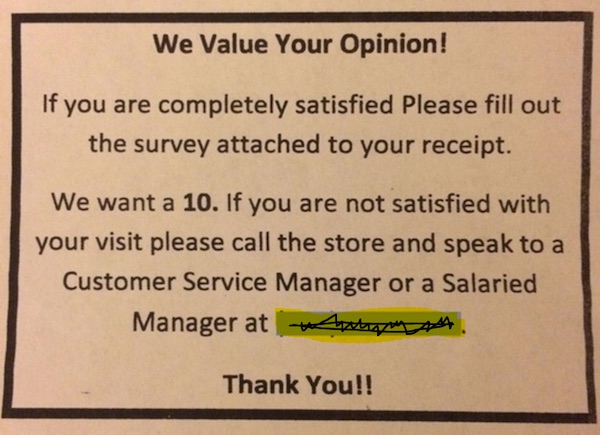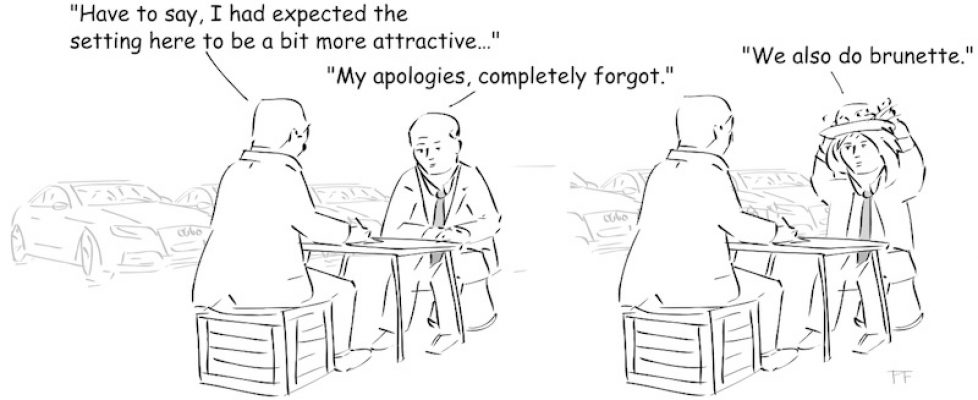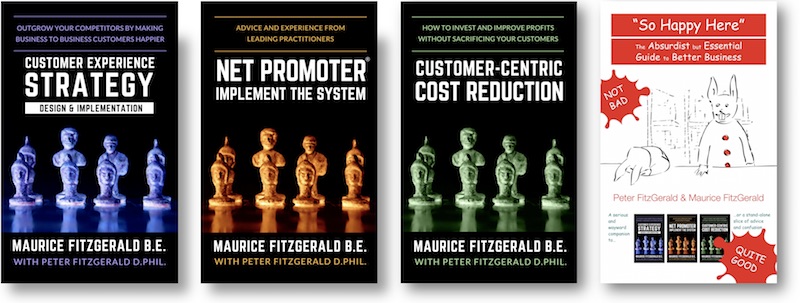NPS (21) – How not to do customer research (Audi and a supermarket) – 21st article in the series on NPS
Welcome to the 21st post in my extensive series on NPS and the Net Promoter System. Following the numerous reactions to what I posted about the British Airways research process last week, here are my views on the way car dealers survey customers in general and about Audi’s process in particular. I also cover a supermarket.
I suppose I should start by emphasizing that Audi is far from being the only car manufacturer doing what I am about to describe. It seems to be a standard practice for car brands.
Buying a car
Following her purchase of a new Audi, my daughter received a survey request from her salesperson. He provided the link, and added a covering note saying, “Please contact me if you cannot give me a 10.” I was surprised to see evidence of this horrible practice reaching European car dealers. It is the rule, rather than the exception in the USA. The General Motors head of customer experience explained it in a pubic seminar. Sales people typically need to average over 95% satisfaction in the GM dealer surveys to be able to participate in their bonus scheme. One low score can require ten perfect scores to even it out.
David Mingle, Executive Director, North American Customer Experience for GM said that he knows this and is not going to do anything about it. He said he personally pays no attention to the scores, only to the written comments. He says customers tend to be honest in their written comments. The sales people are only measured on the scores and don’t care what the customer writes about the experience. This is clear evidence of a research process that provides no value. If individual dealerships and sales people have no motivation to read and act on the comments, why should a customer answer the survey at all?
Consequences
While this may seem to be an interesting anecdote, though backed by facts, it has major consequences. These consequences are evident in the USA and will come to Europe too. In the USA, car prices are considered to be highly negotiable. There are plenty of websites that give advice about how much a General Motors franchisee has to pay for a particular car, providing the customer with the lowest possible price. I invite you to do your own searches. You will easily find suggestions to use the survey score as a price negotiation point. It is attractive in that the cost to the sales person of lowering the price is zero, while the benefit of a 10 may be high, and costs you nothing. If car companies internalized this, I believe they would change their bonus systems. Indeed, if you receive messages saying “If you can’t give me a 10…” during a negotiation process, you should probably negotiate a little more, no matter what it is you are buying.
Not the only defect in their survey
The Audi survey is somewhat strange. I feel they do not understand the difference between something that matters and something that makes a competitive difference. The illustration below shows the way their US dealer survey from a couple of years ago describes what a 10 means:

It is not appropriate to label intermediate numbers in rating questions, just the extremes. Personally, I find the difference between “Outstanding” and “Truly Exceptional” hard to understand, let alone worthy of a three-point difference. I also consider the appearance of the facility to be a hygiene factor. Once it is good enough, it has no impact on your purchase. I don’t see how it could be a motivator. The same applies to the “comfort of the area or office where you agreed to the price of your vehicle.” What is the added value in getting a score above a five, for example? Indeed, perhaps it should be uncomfortable so you want to negotiate quickly and leave.
Of course, many other companies do the same thing. According to employees at Walmart, Old Navy, Staples and Best Buy, they are measured on receiving 10s and interrogated about receiving anything less. The slip of paper shown below is what one US supermarket allegedly gave customers with their receipts:

Conclusion
There are many ways to cheat or bias your feedback system. This is just one. For a number to be credible, the people who are asking you to fill out the surveys must have no direct motivation to achieve a specific score. They should only be motivated by the desire to improve.
Next time
In the next article I will consider the case of AppDynamics; a company that almost gets its customer research right but seems to fail at the last hurdle.
As is often the case, the above is a slightly-edited version of a chapter in one of our books; in this case Net Promoter – Implement the System All of our books are available in paperback and Kindle formats from Amazon stores worldwide, and from your better book retailers.




